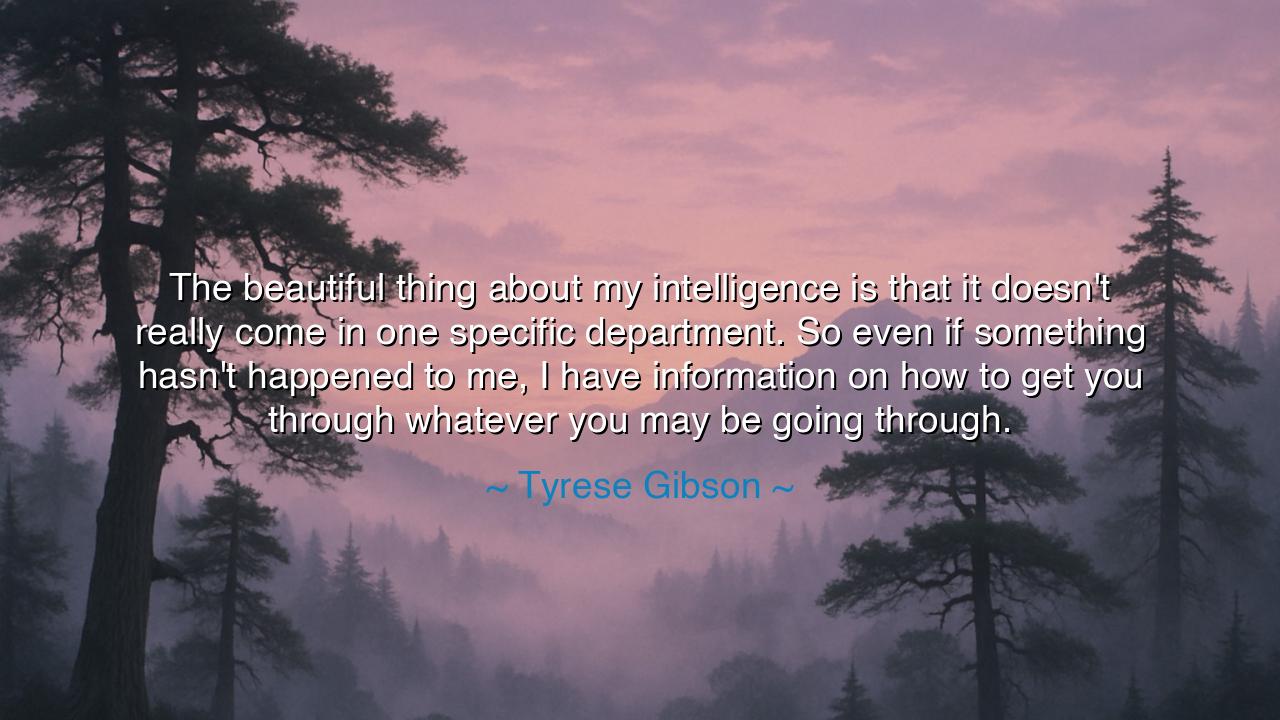
The beautiful thing about my intelligence is that it doesn't
The beautiful thing about my intelligence is that it doesn't really come in one specific department. So even if something hasn't happened to me, I have information on how to get you through whatever you may be going through.






The words of Tyrese Gibson, “The beautiful thing about my intelligence is that it doesn’t really come in one specific department. So even if something hasn’t happened to me, I have information on how to get you through whatever you may be going through,” shine with the light of wisdom born from empathy. Beneath their modern phrasing lies an ancient truth—that intelligence is not only the knowledge of things, but the understanding of people. It is not confined to books or to the lessons of one’s own experience; it is the art of perception, of listening, of feeling the pulse of another’s struggle and knowing how to guide them through it. In this, Tyrese speaks as both a student of life and a teacher of the heart.
To claim that one’s intelligence “does not come in one specific department” is to declare that the mind is vast, flexible, and whole. It is to understand that true wisdom cannot be contained within narrow walls of expertise or profession. Many know how to build machines or write laws, but few know how to mend a spirit, how to listen with compassion, or how to speak words that lift another from despair. Tyrese’s insight celebrates the holistic intelligence—the wisdom that transcends formal learning, that grows not from credentials but from consciousness. It is the intelligence of life itself, which observes, absorbs, and transforms all it encounters into understanding.
The ancients called this kind of wisdom phronesis, practical understanding—the ability to act rightly, even in circumstances one has not personally endured. Aristotle wrote of it as the crown of human virtue: not mere cleverness, but moral insight born from reflection and empathy. So too did the wise teachers of the East speak of compassionate knowing, the mind that sees through illusion into the heart of suffering. This is the wisdom Tyrese invokes—the capacity to stand beside another in their pain and, though not having lived it oneself, to guide them through by drawing upon the deep wells of shared humanity.
Consider the story of Marcus Aurelius, the philosopher-emperor of Rome. Though he lived as ruler of a vast empire, his private writings in the Meditations reveal a mind that sought not dominion, but understanding. He was surrounded by soldiers, senators, and the storms of politics, yet his reflections speak of patience, kindness, and empathy toward all. When plague and war struck Rome, he could not personally feel the hunger of every citizen or the grief of every family—but through wisdom, he understood them, and governed with compassion. His intelligence, too, was not limited to one “department,” but was the kind that transcended circumstance—the kind that heals and unites rather than divides.
Tyrese’s words remind us that intelligence is not measured by what we know, but by how we use what we know to help others. To “have information on how to get you through” something one has not experienced personally is a sign of emotional intelligence, that deep awareness which allows us to learn from the joys and sorrows of others as if they were our own. The wise person studies not only books but faces, voices, and silences. They listen to the language of the heart and see patterns that others miss. In this sense, wisdom becomes a bridge—a way of connecting one human soul to another through understanding.
And there is beauty, too, in his humility. For Tyrese does not boast of his mind as one of superior intellect or pride, but as a gift meant for service. His intelligence, as he describes it, is not for domination but for upliftment—for standing beside another and saying, “I may not have lived your pain, but I can walk with you through it.” This is the spirit of the healer, the teacher, the elder—the timeless figures in every culture who gather wisdom not for themselves, but to light the path of those who follow. To possess such intelligence is to live not for self, but for others, and in doing so, to fulfill the deepest purpose of thought: compassion in action.
The lesson we may draw from this is clear and radiant: do not limit your intelligence to one field or one experience. Cultivate a mind that listens and learns from all things—joy and grief, failure and triumph, solitude and love. Seek not only to be clever, but to be wise; not only to know, but to understand. For it is one thing to master the world’s facts, and another entirely to master the art of being human.
So, my listener, let your mind grow not like a tower but like a garden—rich with variety, open to the sun and the rain alike. Learn from your own path, yes, but also from the paths of others. When a friend stumbles, offer not judgment but guidance; when a stranger grieves, offer not pity but presence. For this is the beautiful intelligence Tyrese speaks of—the intelligence that transcends walls and departments, that lives in the heart as much as in the mind. It is the wisdom that builds bridges between souls and reminds us that to be truly intelligent is to be endlessly compassionate.






AAdministratorAdministrator
Welcome, honored guests. Please leave a comment, we will respond soon